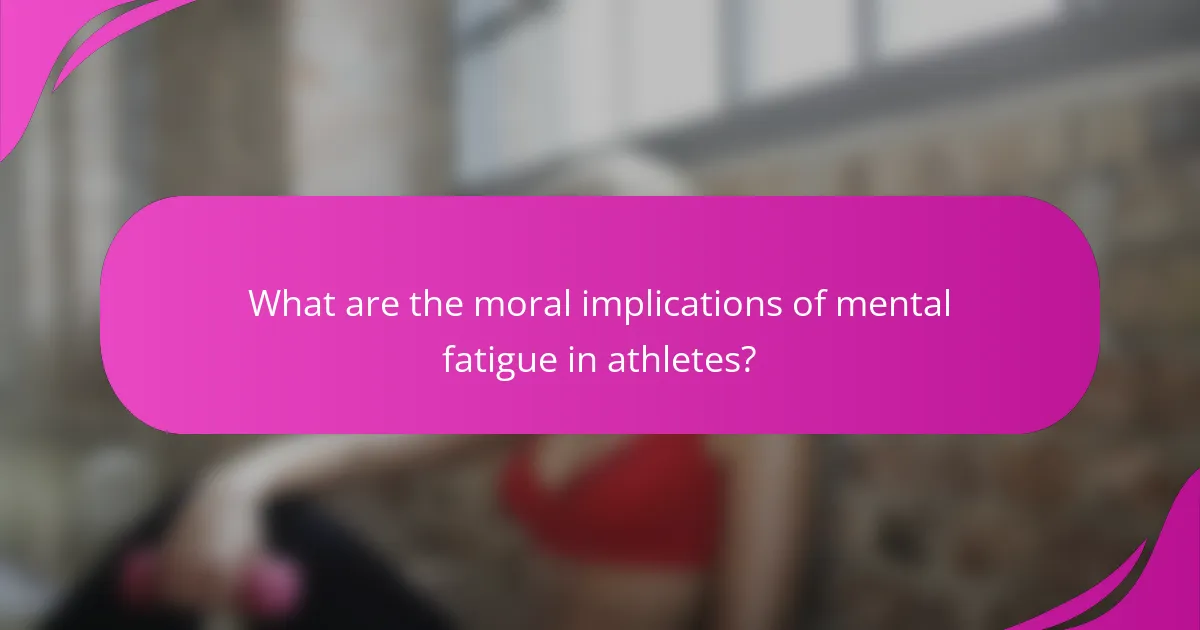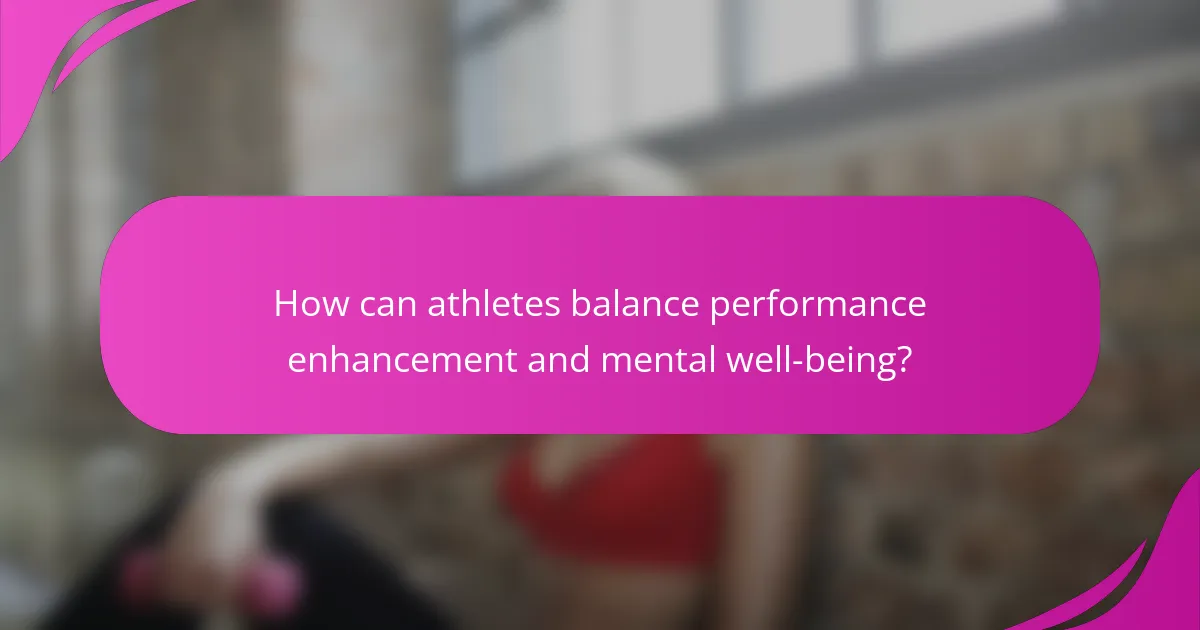Mental fatigue in athletes poses significant moral questions about their health and performance. This article explores the ethical implications of competing under mental exhaustion, strategies for recovery that prioritise mental health, and the integration of nutrition and support systems to enhance performance. By addressing these aspects, athletes can achieve a sustainable balance between performance enhancement and well-being.

What are the moral implications of mental fatigue in athletes?
Mental fatigue in athletes raises significant moral implications regarding their health and performance. Athletes may face pressure to compete despite mental exhaustion, potentially compromising their well-being. This situation poses ethical questions about the responsibility of coaches, organisations, and society in prioritising athlete welfare over competitive success.
Strategies for recovery should emphasise mental health, encouraging rest and psychological support. Implementing mental health days and promoting open dialogue about fatigue can enhance performance and foster a culture of well-being. As a result, addressing mental fatigue ethically can lead to sustainable athletic careers and improved overall performance.
How does mental fatigue affect athletic performance?
Mental fatigue significantly impairs athletic performance by reducing focus, coordination, and decision-making. Athletes experiencing mental fatigue may struggle with motivation and physical exertion, leading to suboptimal results. Strategies for recovery include rest, mindfulness techniques, and structured recovery plans. Research indicates that mental fatigue can decrease performance by up to 20%, highlighting its critical impact on athletes.
What ethical considerations arise from performance enhancement strategies?
Ethical considerations in performance enhancement strategies include fairness, health risks, and integrity. These strategies can create an uneven playing field, leading to questions about equity in competition. Health risks associated with certain enhancements raise concerns about athlete well-being. Additionally, the use of performance enhancers can compromise the integrity of sports, challenging the fundamental values of fair competition.
What are the most common performance enhancement methods?
Athletes commonly use methods like nutrition, hydration, sleep optimisation, mental training, and recovery techniques to enhance performance. These strategies address both physical and mental fatigue, promoting overall recovery.
Nutrition focuses on macronutrient balance and timing, while hydration prevents fatigue and maintains performance. Sleep optimisation improves cognitive function and physical recovery. Mental training techniques, such as visualisation, enhance focus and resilience. Recovery techniques, including active recovery and massage, facilitate physical restoration.
How do these methods impact mental fatigue?
Mental fatigue can be significantly impacted by strategies addressing moral questions in athlete recovery. Techniques such as mindfulness and ethical decision-making can enhance mental resilience. For example, engaging in reflective practices can reduce cognitive load, allowing athletes to recover more effectively. As a result, improved mental clarity can lead to better performance outcomes.
What are the universal strategies for recovery from mental fatigue?
To recover from mental fatigue, athletes can implement strategies focused on rest, nutrition, and mental conditioning. Prioritising sleep enhances cognitive function and physical recovery. Consuming a balanced diet rich in nutrients supports energy levels and mental clarity. Engaging in mindfulness practices reduces stress and improves focus. Regular breaks during training sessions can prevent burnout and enhance overall performance.
What role does rest play in recovery?
Rest is crucial for recovery as it enhances physical and mental restoration. Adequate rest allows the body to repair tissues, replenish energy stores, and reduce fatigue. This is especially important for athletes, as it directly influences performance and overall well-being. Research indicates that sleep quality significantly affects recovery rates and cognitive function, highlighting rest as a unique attribute in recovery strategies. Prioritising rest can lead to improved resilience against mental fatigue, ultimately enhancing athletic performance.
How can nutrition support mental recovery?
Nutrition significantly enhances mental recovery by providing essential nutrients that support brain function and mood regulation. Key nutrients include omega-3 fatty acids, antioxidants, and vitamins like B6 and B12, which contribute to cognitive health. For example, omega-3s found in fish improve mood and reduce anxiety. A balanced diet rich in whole foods can also stabilise blood sugar levels, preventing mood swings. As a result, athletes can achieve better mental clarity and focus, crucial for performance enhancement.
What unique approaches exist for managing mental fatigue?
Unique approaches for managing mental fatigue in athletes include mindfulness training, cognitive restructuring, and strategic rest periods. Mindfulness training enhances focus and reduces stress, while cognitive restructuring helps athletes reframe negative thoughts. Strategic rest periods optimise recovery by preventing burnout, ensuring sustained performance. These methods address the unique mental challenges faced by athletes, promoting resilience and improved mental clarity.
How does mental training contribute to recovery?
Mental training significantly enhances recovery by improving mental resilience and focus. This approach helps athletes manage stress and fatigue, which are crucial for optimal performance. Techniques such as visualisation and mindfulness foster a positive mindset, enabling quicker recovery from physical exertion. Research indicates that athletes who engage in mental training report higher levels of motivation and lower anxiety, supporting faster healing and readiness for competition.
What innovative technologies aid in mental recovery?
Innovative technologies such as neurofeedback, virtual reality, and mobile health applications significantly aid in mental recovery. Neurofeedback trains brain activity, enhancing focus and emotional regulation. Virtual reality immerses athletes in controlled environments, facilitating exposure therapy for anxiety. Mobile health apps provide personalised mental health resources, tracking mood and offering coping strategies. Each technology addresses unique aspects of mental fatigue, promoting overall performance enhancement.
What rare but effective strategies can athletes use?
Athletes can utilise rare but effective strategies such as mindfulness training, cognitive restructuring, and strategic rest periods. Mindfulness training enhances focus and reduces mental fatigue, improving overall performance. Cognitive restructuring helps athletes reframe negative thoughts, fostering resilience. Strategic rest periods allow for recovery and mental rejuvenation, optimising performance during training and competition.
How can mindfulness practices enhance recovery?
Mindfulness practices enhance recovery by promoting mental clarity and emotional resilience. Techniques such as meditation and focused breathing reduce stress, which can lead to improved performance and quicker recovery times. Research shows that athletes who integrate mindfulness experience lower levels of anxiety and higher levels of focus, supporting both mental and physical recovery. This unique approach fosters a holistic recovery strategy, addressing both the psychological and physiological aspects of athletic performance.
What role does psychological counselling play in recovery?
Psychological counselling plays a crucial role in athlete recovery by addressing mental fatigue. It provides strategies to cope with stress, enhances resilience, and improves focus, ultimately leading to better performance. Counselling sessions can help athletes identify underlying issues, develop coping mechanisms, and foster a positive mindset. As a result, athletes experience reduced anxiety, increased motivation, and improved overall well-being. This support is essential for maintaining mental health and achieving peak performance in sports.

How can athletes balance performance enhancement and mental well-being?
Athletes can balance performance enhancement and mental well-being by integrating recovery strategies with mental health practices. Prioritising rest, mindfulness, and open communication fosters resilience.
Implementing structured recovery routines, such as active rest and relaxation techniques, significantly reduces mental fatigue. Research indicates that athletes who engage in mindfulness meditation report improved focus and emotional regulation.
Additionally, establishing a support system with coaches and mental health professionals can address the unique pressures athletes face. This collaboration enhances both performance and mental health, creating a sustainable balance.
Incorporating nutrition and hydration strategies further supports cognitive function and physical recovery. A well-rounded diet rich in omega-3 fatty acids and antioxidants has been linked to reduced anxiety and improved mood among athletes.
What best practices should athletes follow for optimal recovery?
Athletes should prioritise hydration, nutrition, sleep, active recovery, and mental strategies for optimal recovery. Hydration replenishes fluids lost during activity, while nutrition provides essential nutrients for muscle repair. Quality sleep enhances recovery by allowing the body to heal and regenerate. Active recovery, such as light exercise or stretching, promotes blood flow and reduces soreness. Incorporating mental strategies, like mindfulness or visualisation, can further improve recovery and performance.
What common mistakes do athletes make regarding mental fatigue?
Athletes often underestimate the impact of mental fatigue on performance. Common mistakes include neglecting recovery strategies, failing to recognise signs of mental exhaustion, and prioritising physical training over mental conditioning. These oversights can lead to decreased focus, increased stress, and suboptimal performance outcomes. Implementing structured mental recovery techniques can enhance overall athletic performance and resilience.
How can coaches support athletes in managing mental fatigue?
Coaches can support athletes in managing mental fatigue by implementing structured recovery strategies. These strategies include establishing a balanced training schedule, promoting open communication, and encouraging mindfulness practices.
A balanced training schedule prevents overtraining, allowing athletes to recover physically and mentally. Open communication fosters a supportive environment where athletes feel comfortable discussing their mental challenges. Mindfulness practices, such as meditation or breathing exercises, can enhance focus and reduce stress.
Coaches should also monitor athletes’ mental states regularly, using unique attributes like performance metrics and subjective feedback. This data can inform adjustments to training and recovery plans. By prioritising mental health, coaches can enhance overall performance and well-being.
What expert insights can enhance understanding of mental fatigue recovery?
Expert insights emphasise the importance of mental recovery strategies for athletes facing mental fatigue. Techniques such as mindfulness, structured recovery periods, and cognitive behavioural approaches can significantly enhance performance. Research shows that integrating rest days and mental exercises can reduce fatigue and improve focus. Additionally, fostering a supportive environment encourages open discussions about mental health, ultimately aiding recovery. These strategies not only address immediate fatigue but also promote long-term resilience in athletes.